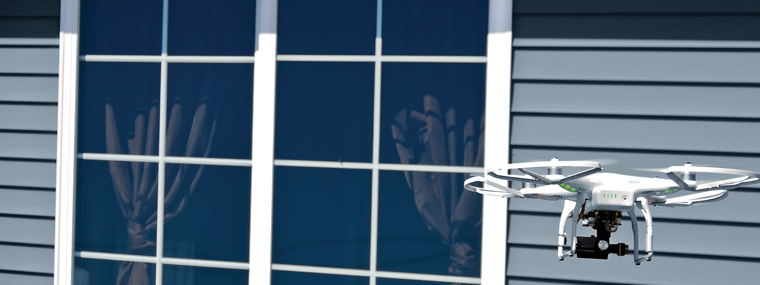
New FAA Drone Regulations Do Little to Protect Individual Privacy Rights
By Roger Slade, Esq. & Jacob Epstein, Esq. / Published December 2016
In June 2016, the Federal Aviation Administration (FAA) released regulations spanning 407 pages known as the “Small Unmanned Aircraft Rule Part 107,” which created additional regulations for commercial drone operations in the United States. Part 107, however, will do little to protect South Florida residents from the privacy concerns that arise from this new industry, as Part 107 does not set forth privacy restrictions or guidelines and will also not affect the use of model/recreational aircraft. These rules, however, will likely make it more difficult for commercial drones to operate in residential areas. Condominium and homeowners associations will largely remain in the same position as before the rules were enacted—without any concrete privacy protections from the FAA from the potential abuses of drone operations.
The FAA advised in a press release that it is acting to address privacy considerations in this area and will provide drone users with “recommended privacy guidelines” as a part of the registration process. However, there is no indication when these guidelines will be released, whether these prospective guidelines will be enforceable, and how they will be enforced. Associations and individuals are still left with individual state or federal privacy laws as their only potential avenue of redress.
Although Part 107 does little to address the privacy concerns raised by drone use, it does provide for certain safety and use requirements. The new regulations provide that commercial pilots must keep an unmanned aircraft within visual line of sight—a requirement which already exists for recreational drone users. Furthermore, commercial operations are permitted so long as such operations are conducted during daylight hours or during twilight hours only if the drone has anti-collision lights. The new regulations also prohibit drone operation over unprotected people on the ground who are not directly participating in drone operation, and require that a person flying a drone must be at least 16 years old, have a remote pilot certificate, or be directly supervised by someone with such a certificate.
What does the release of Part 107 mean for South Florida condominium associations and homeowners associations? The answer: not much. These new rules do not protect South Florida residents but, instead, seem geared for the potential impact that the drone industry will have on the national economy. Instead of relying on the FAA to protect the residents of South Florida, individual unit owners and management companies will need to take it upon themselves to ensure that their privacy rights are protected.
The FAA has high hopes for Part 107. As of January 2016, the FAA advised that more than 181,000 drones had registered with the Federal Government. A June 21, 2016, FAA Press Release estimates that Part 107 “could generate more than $82 billion for the U.S. economy and create more than 100,000 new jobs over the next 10 years.” The federal government expects big things from the drone industry, and these new rules appear designed to foster those expectations.
Part 107 makes it more difficult for commercial drone users to operate their drones in residential areas; however, this likely does not mean much for South Florida condominium associations and homeowners associations. As of May 2016, the city of Miami had 50 commercial drones registered with the FAA and 2,047 recreational drone users. These regulations do very little to protect the privacy of South Florida residents and/or to regulate recreational use. The more relevant concern remains with “recreational” drone use.
Even if a drone operator is found to be in violation of Part 107 (for commercial users) or Section 336 of Public Law 112-05 (for recreational drone users), what can be done to enforce these rules? For example, if a resident observes a drone hovering over outdoor common areas on association property (where people congregate) or operating at night, the drone would likely be in violation of these regulations. But what can the association do?
Citizens have the option to report violations of Part 107 or other FAA drone regulations to local law enforcement. The FAA has formal enforcement authority of such regulations, and the new rules advise that violation of the regulations can result in civil penalties and/or the suspension or revocation of an airman certificate. On their website, the FAA advises citizens to contact local law enforcement if they wish to report a drone-violation incident. Additionally, the FAA advises that an “Online Accident and Incident Reporting” portal will become available. However, what recourse does this truly provide? Are unit owners expected to call the FAA or the police when they see a drone hovering outside of their balconies? Is the Miami Police Department really going to send uniformed officers to investigate an incident of unauthorized drone operation? Such procedures will arguably be difficult to implement.
Condominium association and homeowners associations can streamline the reporting process and create a procedure through management companies to report drone use to the authorities. Were multiple unit owners to notice a drone flying over the property and/or veering onto owners’ balconies, the owners could report each incident to the management company, who could then compile records of reported incidents, creating a comprehensive list which could be reported to the authorities. Once such a list is created, the job of law enforcement could arguably be streamlined to lead to more effective results.
Additionally, condominium and homeowners association owners can also protect their privacy rights in other ways, such as individual civil actions against the person/entity violating an individual’s privacy.
The monitoring of commercial drone use may be more feasible under these new regulations, but this is unclear. Associations should consider creating reporting procedures if drone operation becomes an issue. However, at this time, due to the very small number of drones in South Florida, this might not yet be necessary. Although the FAA has not yet promulgated its privacy guidelines, the right to bring private causes of action potentially remains available, and the FAA is encouraging the reporting of incidents to local law enforcement.
However, how will violators of these rules be prosecuted or prohibited from acting in the future? Although the FAA makes vague reference to the imposition of civil penalties or the revocation of a license, will these penalties actually deter the wide-spread use of drones in violation of the rules that are in place? It is simply too early to tell. In the meantime, an association should be mindful of any drones operating in a fashion that might jeopardize the safety and privacy of their residents and keep the current regulations and enforcement procedures in mind.
Roger Slade, Esq.
Partner at Miami-Based Haber Slade
Roger Slade is a partner at Miami-based Haber Slade. He is a commercial litigator who specializes in contract and partnership disputes, real estate litigation, and employment matters. He can be reached at rslade@dhaberlaw.com.
Jacob Epstein, Esq.
Associate with Haber Slade
Jacob Epstein is an associate with Haber Slade. He concentrates his practice areas on business litigation, condominium and community association law, construction law, and real estate litigation. He can be reached at jepstein@dhaberlaw.com. The firm is on the Internet at www.haberslade.com.




